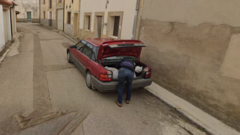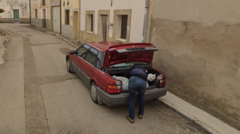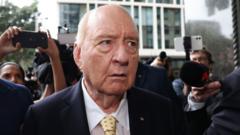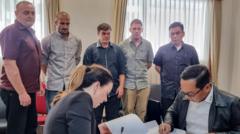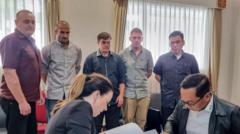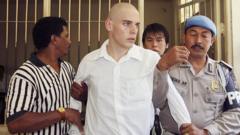As King Charles and Queen Camilla concluded their tour in Sydney, an arrest of a prominent Aboriginal activist has sparked controversy and discussion about the ongoing issues faced by Indigenous communities in Australia.
Aboriginal Activist Detained Amid Royal Visit in Sydney
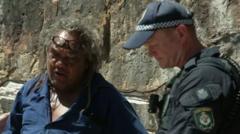
Aboriginal Activist Detained Amid Royal Visit in Sydney
Tensions rise as protests echo during the King's tour, highlighting a divide between royal supporters and Indigenous activists.
Wayne Wharton, a Kooma man and renowned Indigenous activist from Brisbane, was taken into police custody after defiantly shouting anti-monarchy slogans during the royal couple's arrival at the iconic Sydney Opera House. This incident occurred on a day when thousands gathered to catch a glimpse of the monarchs while many waved miniature Union Jack flags, enthusiastic about their visit. Wharton's passionate display, including chants of “he’s not my King,” resonated with sentiments expressed earlier by fellow Indigenous Senator Lidia Thorpe during her heckling of King Charles in Canberra.
The public reaction was polarized; while many applauded police efforts to maintain order, supporters of Wharton voiced their concern for the government’s treatment of Indigenous issues. Karen Clark, a royal enthusiast, articulated her joy for the event while acknowledging the clash of views, indicating a clear divide within public sentiment. “We want to celebrate our country and all the people in it,” she said optimistically, yet brewing tensions are evident.
Conversely, some participants in the festivities condemned Thorpe's heckling as inappropriate, acknowledging the fine balance between political expression and the decorum of royal visits. “I thought it was a little rude,” voiced attendee Taja Shephard.
In the midst of these contrasting perspectives, King Charles's visit to the National Centre of Indigenous Excellence demonstrated a recognition of Aboriginal leaders and their history. This symbolic engagement is seen by many as an essential aspect of addressing the grievances faced by Indigenous Australians.
As the debate unfolds, Wharton’s arrest, alongside the reactions to protests against the royal family, underscores the broader challenges of reconciling royal traditions with the contemporary struggles of Indigenous rights within Australia’s socio-political landscape.
The public reaction was polarized; while many applauded police efforts to maintain order, supporters of Wharton voiced their concern for the government’s treatment of Indigenous issues. Karen Clark, a royal enthusiast, articulated her joy for the event while acknowledging the clash of views, indicating a clear divide within public sentiment. “We want to celebrate our country and all the people in it,” she said optimistically, yet brewing tensions are evident.
Conversely, some participants in the festivities condemned Thorpe's heckling as inappropriate, acknowledging the fine balance between political expression and the decorum of royal visits. “I thought it was a little rude,” voiced attendee Taja Shephard.
In the midst of these contrasting perspectives, King Charles's visit to the National Centre of Indigenous Excellence demonstrated a recognition of Aboriginal leaders and their history. This symbolic engagement is seen by many as an essential aspect of addressing the grievances faced by Indigenous Australians.
As the debate unfolds, Wharton’s arrest, alongside the reactions to protests against the royal family, underscores the broader challenges of reconciling royal traditions with the contemporary struggles of Indigenous rights within Australia’s socio-political landscape.







